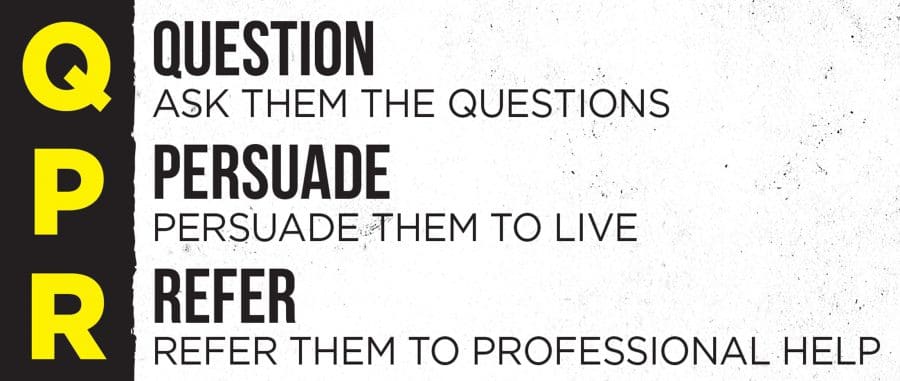In January, the Citizen Potawatomi Nation Behavioral Health Department held its first QPR suicide prevention training for Tribal employees. QPR stands for “question, persuade and refer.” Licensed Professional Counselor Rickey Whisenhunt taught the course from the QPR Institute.

“Mental health, suicidal thoughts and ideations is something we don’t talk about and is a taboo,” Whisenhunt said. “Just something as simple as three little letters — QPR — that stick in your brain that you can remember to use could save a life.”
Funded through a Methamphetamine and Suicide Prevention Initiative grant from Indian Health Service, the volunteer opportunity teaches attendees how to respond to a potentially suicidal individual. Members of CPN’s Behavioral Health Department see it as a valuable form of mental health first aid.
By the numbers
Suicide ranks as the United States’ 10th leading cause of death with over 1.25 billion attempts in 2017, according to the American Foundation for Suicide Prevention.
“We’re in our phones. We’re busy; we’re busy, busy, busy. I would say first off, we need to start looking up,” Whisenhunt said.
“Get comfortable with asking questions. Get comfortable with asking people how they’re feeling. Just break your own personal barriers to that kind of awkward feeling, and just ask.”
Between 2000 and 2016, American Indians were the ethnic group with the highest suicide rate according to the Suicide Prevention Resource Center. Its data show an opposite age pattern of the general population with more Native American and Alaska Native youth killing themselves than those between ages 45 and 65.
The QPR training reduces stigma, and attendees can help those in distress stay safe and visit a professional, which they may have not done before sharing with someone close to them.
Making “Gatekeepers”
After taking the class, attendees receive a certificate titling them “Gatekeepers.” The first class in January welcomed nine participants.
“It’s cut and dry. I think that that’s what will make it easier for people and for us to get the word out quicker and be able to provide the community with the knowledge … The primary information — the meat and potatoes — are in this one hour,” Whisenhunt said.

According to him, some of the essential portions of the course include how to question someone, both directly and indirectly, as well as a handout with a list of community resources for a swift referral to professional assistance.
CPN East Clinic switchboard operator Ida Tuttle signed up for the first session. She took a similar course several years ago, but the refresher impressed upon her the need to give people hope during her shifts.
“You might be the only person that is nice to them the whole day because they don’t see anybody else, or they don’t talk to anybody else, whatever reason. But if you can just be pleasant and friendly — that right there already opens the door,” she said.
“I might have eight or 10 calls just right on top of each other, and that eighth call has to be just as important and just as pleasant as the first one.”
Response from CPN employees eager to take the course grew, and the department anticipates switching to a semi-monthly schedule.
“If one person is helped out there, we’ve done this, and we’ve done the right thing,” Whisenhunt said. “I just know that’s got to be right. So, I’m excited. That makes me excited.”
The QPR Institute offers online training for a one-time cost at cpn.news/QPRonline. Find more information about the Citizen Potawatomi Nation Behavioral Health Department at cpn.news/CPNBH. The National Suicide Prevention Lifeline is available 24/7 by phone at 1-800-273-8255 and online at suicidepreventionlifeline.org/chat.
